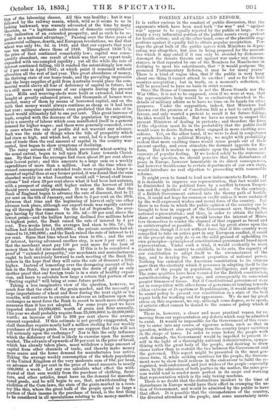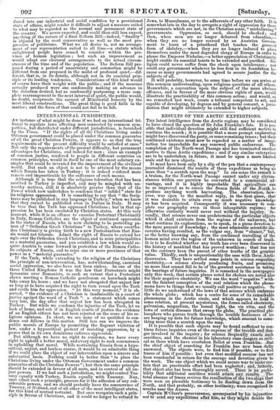FOREIGN AFFAIRS AND REFORM.
IT is rather curious in the conduct of public discussion, that tho arguments which have been used both "for war " and " against war" appear to be equally rejected by the public at large. Cer- tainly a very influential portion of the public scouts every pretext for hostile action ; and on the other hand, some of the plausible sug- gestions against it equally fail to obtain popular acceptation. Per- haps the great bulk of the public agrees with Ministers in depre- cating war altogether, but also in being prepared for the necessi- ties which it may entail if it can only be .avoided by dishonour. Amongst the threats thrown out against war under any circum- stances, is that repeated by one of the Members for Manchester in declining to meet his constituents, that " it would postpone the promised Parliamentary Reform, it may be for many years." There is a kind of vague idea, that if the public is very busy about one thing it cannot attend to another : and so far the hint receives acceptation ; but in truth, on a moment's reflection, it will be perceived to have no basis in strict reason.
Since the House of Commons is net the Horse Guards nor the War Office, it is not to be supposed, even if we were at war, that the representative body would be so exclusively absorbed in the details of military affairs as to have no time on its hands for other purposes. Under the supposition, indeed, that Ministers had thrown out the promise of a Reform Bill as a bait to catch public favour, and only wanted a pretext to recall it for future fishing, the idea would be tenable. But we have no reason to suspect the present Ministers of dealing in pretexts ; and therefore the force of the objection must lie in the probability that the public itself would cease to desire Reform while engaged in more exciting avo- cations. Yet, on the other band, if we were to deal in conjectures or prophesies like a political Murphy, we might with probability reckon that more exciting times would rouse people out of their present apathy, and even stimulate the dormant appetite for Re- form. But it is useless to speculate upon the possible turns and currents of popular feeling. If we looked solely to the statesman- ship of the question, we should perceive that the disturbance of i peace in Europe, however lamentable in its direct consequences, and however troublesome to certain departments of our own state, would introduce no real objection to proceeding with reasonable reforms.
It might even be found to lend new inducements to Reform. If it is desirable to improve our representation, that fact would not be diminished in its political force by a conflict between Despot- ism and the upholders of Constitutional order. On the contrary, if a British Government entered into the thorny path of hostili- ties, it could not hope for success or credit unless it were sustained by the well-expressed wishes and moral force of the country. But there is no form in which the public opinion of the country can be brought to bear in support of the Government save through the national representation ; and thus, in order to obtain the fullest share of national support, it would become the interest of Minis- ters themselves to render the channel of that support as broad and as uninterrupted as possible. We do not lay great stress upon the suggestion, though it is not without force, that if this country were compelled to take an active part in any European conflict, it could at the present day only do so on the solid ground of upholding its own principles—principles of constitutional government based upon representation. Under such a trial, it would evidently be most desirable for this country to establish, in its acts, the capacity of our constitution to adapt itself to the circumstances of the day, and to develop the utmost proportion of national power. Nothing has endeared the American constitution to its citizens more than the elasticity which it possesses in adapting itself to the growth of the people in population, intelligence, and property. The same qualities have been vaunted for the British constitution, notwithstanding its greater age, and consequently its somewhat greater firmness of tissue. But if Constitutional government were set in competition with other forms of government tending towards either extreme of Despotism or Republicanism, it would manifestly be sound policy to present our constitution in a state of the best repair both for working and for appearance. We do not lay great stress on this argument, we say, although some degree, so to speak, of artistic effect cannot be denied to the course of policy which it involves.
There is, however, a closer and more practical reason for re- moving from our representation any defects which may be admitted to exist. It would be impossible for the Government of this coun- try to enter into any course of vigorous action, such as that in question, without also requiring from the country larger sacrifices in the shape of taxes. In order to come before the people with such demands, the Government would be impelled to present it- self in the light of a thoroughly national Administration, sympa- thizing with the great body of the people, and desiring to draw closer rather than to restrict the ties between the Government and the governed. This aspect might be presented in the most gra- cious form, if, while seeking sacrifices for the people, the Govern- ment were to show itself zealous in the endeavour to fulfil the re- cognized, well-understood, and just wishes of the people ; especially since, by the admission of both parties in in matter, the same pro- cess would tend to render more perfect n its scope and working that representation which is the only taxing machine. There is no doubt that the distractions incident to the time of disturbance in Europe would have their effect in cramping the ac- tion of Government, and would be admitted by the public to have that effect. It is possible that the circumstances of the country, the diverted attention of the people, and some uncertainty intro-
duced into our industrial and social condition by a provisional state of affairs, might render it difficult to adjust a measure suited to what may be regarded as the normal and permanent state of the country. We never expected, and could then still less expect, anything of the nature of a final Reform Bill—indeed, " finality" is abjured by the most conservative as well as the most pro- gressive of politicians. What we all desire is, not an arrange- ment of our representation suited to all time—a statute which enlightened people have ceased to consider within the pro- vince of human legislation ; but such an improvement as would adapt our electoral arrangements to the actual circum- stances of the time and of the population. The Reform Bill pro- posed during a period of uncertainty and commotion might be different from one proposed in the midst of profound quiet,—dif- ferent, that is, in its details, although not in its essential prin- ciple or its leading tendencies. Considerations of this kind would of course have their weight with the public ; and if the measure actually produced were one confessedly making an advance in the direction desired, but as confessedly postponing a more com- plete rearrangement to the next interval of quiet, the public would, no doubt, reciprocate the earnest of Ministerial honesty by the most liberal constructions. The great thing is good faith in the matter; and the force of that could not fail to be felt.



























 Previous page
Previous page